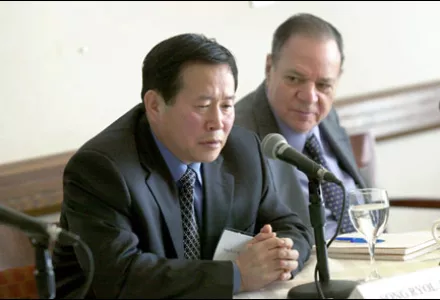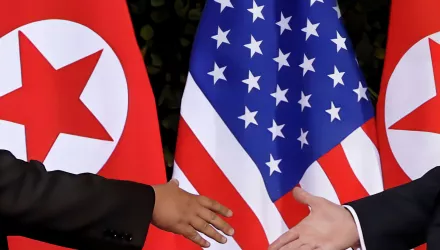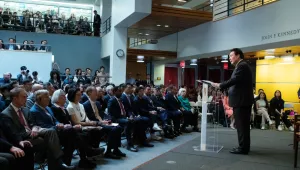Cambridge, MA. Ambassador Han Song Ryol, North Korea's Ambassador to the UN, made a rare visit to Harvard University for a special closed-session roundtable on the Korean nuclear crisis. Ambassador Han is the Democratic People's Republic of Korea's (DPRK) Deputy Permanent Representative to the United Nations. The meeting, which was held December 19th, brought together scholars, Congressional staffers and North Korean diplomats for a frank but friendly exchange of views.
From left to right: Prof. Carter Eckert, Director, Harvard Korea Institute; DPRK Amb. Han Song Ryol; DPRK Counselor Kim Yong; Dr. Jim Walsh, Director, Managing the Atom Project. Courtesy: MTA Project.
The meeting, entitled "The Nuclear Issue on the Korean Peninsula: Prospects and Possibilities," was co-sponsored by the Kennedy School's Managing the Atom Project (www.managingtheatom.org), Harvard University's Korea Institute (www.fas.harvard.edu/~korea), and The Korea Society in New York (www.koreasociety.org).
The one-day session provided a venue for Ambassador Han and the American participants to discuss ways to improve U.S.-DPRK relations. The core focus was on examining perceptions that each country had of the other and how misunderstandings have compounded the difficult task of negotiating a resolution to the nuclear crisis.
Professor Carter Eckert, Director of Harvard's Korea Institute, was encouraged by the discussions. "I think both sides raised issues that are ripe for additional dialogue, and that all the parties learned something new about the others' points of view. It was a very productive and important step."
During the course of the meeting, some of the American participants emphasized that North Korea had to agree to a verifiable and irreversible halt to its nuclear weapons program. The North Korean position appeared open to this objective, but expressed concern that American commitments (for example, promises not to attack North Korea) should also be verifiable and irreversible.
Dr. Jim Walsh, Executive Director of the Kennedy School's Managing the Atom Project, moderated the meeting and believed that the exchange of views may mark the beginning of a new phase of dialogue. "Ambassador Han forcefully presented the North Korean position, but he also listened to our comments, and responded thoughtfully. My hope is that we can build on this first meeting and have Harvard serve as a host for future dialogues on the nuclear crisis."
For more information about the North Korean nuclear talks, contact Dr. John Park at 617-495-4219.



